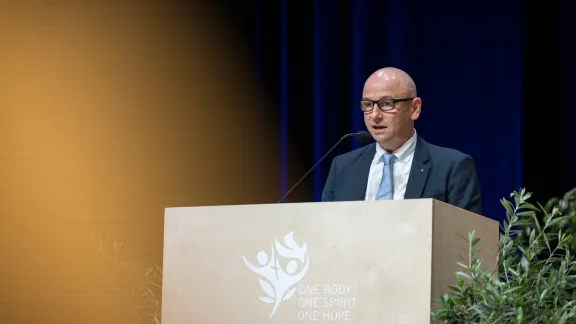14 SEP 2023
Finance Committee Chairperson Oberkirchenrat Mirgeler presents positive report to Assembly
In his report to The Lutheran World Federation (LWF) Thirteenth Assembly, the chairperson of the organization’s finance committee, Oberkirchenrat Olaf Johannes Mirgeler said income has increased over the six-year period since the last LWF Assembly in 2017.
“At a time when many churches and church-related organizations were faced with financial challenges, we can look back with gratitude for the growth in LWF’s resources,” Mirgeler said. This growth, he noted, is an important contribution toward the stability and sustainability of the LWF.
His report to LWF’s highest decision-making body gave a comprehensive overview of financial results between 2017 and 2022 and a preliminary projection on 2023.
Mirgeler, a church leader in the Evangelical Lutheran Church in Northern Germany, underlined the unwavering support of LWF’s member churches, related organizations, ecumenical and institutional partners for making it possible for the Lutheran communion to fulfill its mission. They are important not only as financial contributors but also in their shared common purpose, vision, and objectives of “providing joint support to program initiatives and addressing crises across the globe.”

Chairperson of the Finance Committee Oberkirchenrat Olaf Mirgeler presents in plenary. Photo: LWF/Albin Hillert
Data highlighted in the report show that overall revenues increased despite declining income from some traditional donors, the impact of the COVID-19 pandemic, currency exchange fluctuations, and stress on global economies. The finance chairperson particularly expressed gratitude for the sustained support during the global health crisis.
During the 2017 – 2022 period, income ranged from EUR 166 million to EUR 178 million. At the same time, the annual expenditure ranged from EUR 142 million in 2016 to EUR 176 million in 2022. The planned budget for 2023 is EUR 190 million.
LWF’s overall reserves increased from EUR 50 million in 2017 to EUR 88 million in 2022. The general reserves increased from EUR 9.9 million to EUR 15.7 million. Growth in the reserves is attributed primarily to the operational surpluses of the Augusta Victoria Hospital (AVH) in East Jerusalem.
Membership fees
The report points to the importance of membership fees from LWF member churches in sustaining theological and ecumenical work. During the period 2017-2022, membership fee contributions totaled EUR 19 million, compared to EUR 16.8 million in the previous Assembly period. Membership fees are calculated based on a fair membership principle, taking into account the wealth of each church relative to other member churches, and factors such as size and the country's wealth index.
“Realizing the goals outlined in the fair membership policy requires ongoing commitment from our member churches and the advocacy of the LWF Council, particularly the regional vice-presidents and other church leaders,” the finance committee chairperson stated.
Assembly budget
The Thirteenth Assembly was budgeted at EUR 3.2 million. Increased cost of travel due to COVID-19, as well as global inflation have had a direct impact on the anticipated budget. To date, LWF has received financial pledges totaling EUR 2.8 million, which covers 88 percent of the budget. The finance chairperson expressed his conviction that “with your support” the Communion Office leadership would ensure that the Assembly expenses are fully covered.
Ensuring a sustainable future
In 1999, the LWF established an Endowment Fund to secure the organization’s financial sustainability. By 2022, contributions to the fund had reached CHF 14.8 million. The fund’s annual investment is distributed toward LWF’s programmatic work, which amounted to CHF 3.6 million during the 2017 – 2022 period.
Mirgeler told the Assembly the Endowment Fund board has embarked on a campaign to support LWF’s long-term sustainability. The objective is to generate a consistent income stream through a diversified portfolio that manages risk and strategic asset allocation while respecting the organization’s investment principles.
In his report, he highlighted the measures implemented by the LWF over the past six years to strengthen its financial management practices in response to global economic challenges. These include improvements to operating systems that ensure timely and accurate reporting.
In looking to the future, a comprehensive sustainability direction has been established to address income generation, sustainable programming, treasury management, cost management, and opportunities to increase unrestricted funds. At the same time, the LWF has developed a risk management framework to mitigate operational risks, including those associated with cash flow concerning the AVH.
Mirgeler concluded his report by commending the Communion Office leadership for having ensured that the LWF maintained a balanced budget and established sufficient cash reserves to guarantee uninterrupted operations.
“While challenges lie ahead, particularly in the area of sustainability, the LWF has positioned itself well to address these challenges,” the finance committee chairperson said in his closing remarks.
